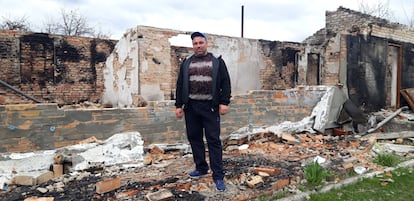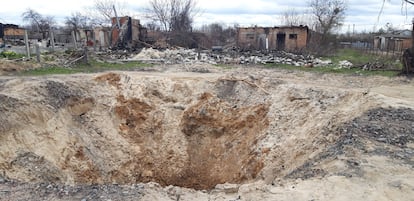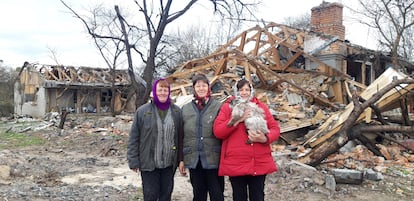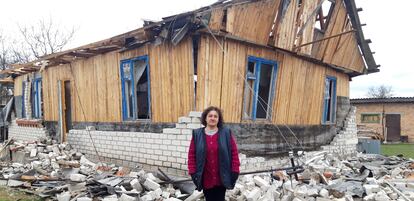The double tragedy of the evacuees of Chernobyl nuclear accident
Russian strikes in the Ukrainian town of Sukachi have destroyed the homes of people who were relocated after the 1986 disaster


On the map it’s Sukachi, but everyone here calls it Novi Ladizhichi (New Ladizhichi). The ‘old’ Ladizichi sits 18 kilometers away from the city of Chernobyl, home of the most famous nuclear accident in history which took place on April 26, 1986.
Volodimir Stekhun was then a child, dragged away from the old town to a new life. Now 42, Stekhun looks at the black rubble that remains from the brick house that he built in Novi Ladizhichi when he got married. The Russian army took over Chernobyl on February 23, the first day of the invasion of Ukraine this year. The house caught fire on February 26, apparently from the impact of a projectile.
“My family and I heard a strange sound and then the crack of the burning roof,” he tells EL PAÍS. “Neighbors helped us put [the fire] out with water. We took refuge in the basement, and about four or five hours later, the roof was on fire again. We couldn’t do much. We had a lot of water in the basement, but we could only carry it with buckets. We spent the night throwing buckets of water [on the fire], but it hardly did any good.” He points sadly to the house and adds, “Here you see the result”.
Having survived the 1986 accident, Stekhun says “the Russians are creating a tragedy here for the second time.”
With his wife and one of his two children, Stekhun has moved into the house next door, which belonged to his father, who died shortly before the war began. His other son is a member of the Ukrainian National Guard who went to defend Hostomel airport near Kyiv and was captured shortly after the invasion began. He is now being held by Russia as a prisoner of war.

A year after the town was evacuated due to the Chernobyl explosion, Stekhun’s grandparents returned to the old Ladizhichi, where he would visit them until their deaths in 2010. “I liked going,” he says, “it reminded me of my childhood.”
Today, a small community of returnees remains there, living mostly from farming. It has low levels of radiation now and, in peacetime, it is a site for guided tours. As though cursed by history, the town had already been devastated by the Nazis during World War II, four decades before the nuclear accident.
New town, new disaster, old lives
For Natalia Ribachok, “at exactly 6pm” on February 25, a mortar shell hit the roof of the home in Novi Ladizhichi where she lived with her two children. Miraculously, the house remains standing, although badly damaged. The 44-year-old moved here from Kropivnitskii, almost 400 kilometers away, six years ago to marry a local man who has since abandoned the family. With their home now uninhabitable, another local family is now hosting Natalia and her children.
EL PAÍS also spoke with Valentina, who was uprooted from the old town in 1986 at age 22, along with her husband “and two cows.”
Of the day of the nuclear accident, she recalls that “people talked about something bad happening, but there was little information.”
Valentina made friends and got to know her neighbors and ended up accepting Novi Ladizhichi as her new home. Now 58, she points to a huge crater, about five meters deep, made on February 24 by the explosion of a powerful bomb across the road from the home she relocated to 36 years ago.

She was in the basement, which she used to store potatoes before it became an improvised community shelter, when the explosion occurred and “lifted me off the seat a little bit.”
“We were three adults and two teenagers. We prayed the whole time,” she says, adding that they could only see the red lights of what looked like tanks while the sound of explosions got closer.
Valentina remembers how, in 1986, the Soviet authorities took just three months to build the new town, twice as far from Kyiv (about 80 kilometers) as from the southern border of Belarus. The two republics, Ukraine and Belarus, now on opposite sides, were then part of the USSR.
“I have not yet accepted that we have a war in our country [and between] our people,” says Valentina, adding that she does not have the strength to relocate once more.
Here, she is used to cooking borscht soup, “commenting on life and complaining about the government together” with her friends, she says, as some of those friends laugh and nod. One of them, 51-year-old Nina Vasilenka, interjects: “It was simple and poor people who suffered in 1986 and [we] are the ones who suffer now.”

Tu suscripción se está usando en otro dispositivo
¿Quieres añadir otro usuario a tu suscripción?
Si continúas leyendo en este dispositivo, no se podrá leer en el otro.
FlechaTu suscripción se está usando en otro dispositivo y solo puedes acceder a EL PAÍS desde un dispositivo a la vez.
Si quieres compartir tu cuenta, cambia tu suscripción a la modalidad Premium, así podrás añadir otro usuario. Cada uno accederá con su propia cuenta de email, lo que os permitirá personalizar vuestra experiencia en EL PAÍS.
¿Tienes una suscripción de empresa? Accede aquí para contratar más cuentas.
En el caso de no saber quién está usando tu cuenta, te recomendamos cambiar tu contraseña aquí.
Si decides continuar compartiendo tu cuenta, este mensaje se mostrará en tu dispositivo y en el de la otra persona que está usando tu cuenta de forma indefinida, afectando a tu experiencia de lectura. Puedes consultar aquí los términos y condiciones de la suscripción digital.








































